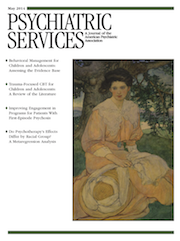Common Factors: Evidence-Based Practice and Recovery
Abstract
The authors of this Open Forum argue that the evidence-based practice movement has not paid adequate attention to the wealth of evidence that supports a central role for the so-called common factors that constitute a therapeutic alliance between practitioner and patient. They also suggest that progress might be made in improving the quality of community-based care for persons with serious mental illnesses and addictions if training programs returned to an emphasis on helping practitioners develop the skills involved in cultivating trusting and empathic relationships with the people they serve. The authors draw connections between the skills needed for such relationships and the skills involved in providing recovery-oriented care and peer support, two recent developments that call for a reinvestment in basic relationship-building skills for all behavioral health practitioners.



